
Chancellor Olaf Scholz, SPD; Robert Habeck, Green Party; Friedrich Merz, CDU; and Alice Weidel, AfD take part in a TV debate in Berlin on February 16, 2025, ahead of this weekend’s parliamentary elections in Germany.
Photo: Kay Nietfeld / POOL / AFP
RTL’s televised electoral debate on Sunday, February 16th, confirmed the clear strategy of Germany’s traditional parties: totally excluding Alternative für Deutschland (AfD). The leading candidates for the chancellorship, Olaf Scholz (SPD), Friedrich Merz (CDU), and Robert Habeck (The Greens), directed their attacks against Alice Weidel, the AfD co-leader, demonstrating an unusual alignment among parties that, in theory, should be opposed due to their ideological differences.
The broadcast quickly turned into a direct confrontation against the representative of Germany’s new right. As expected, the main topics revolved around security, immigration, and foreign policy, particularly the recent Munich attack and managing the migration crisis.
A surprising and unusual occurrence was the absence of the “climate change” topic. Not even the Greens voiced their main political preoccupation of recent years. One possible explanation is that Germany’s economy is in such poor shape that continuing down the unsustainable path of sustainability is a direct way to lose votes. If even the “climate priests” are unable to preach their green gospel, then a political shift is closer than ever.
From the beginning of the debate, Chancellor Olaf Scholz questioned Friedrich Merz for having accepted AfD’s support in a parliamentary motion, accusing him of crossing Germany’s political red line. Merz, who has attempted to position himself as the leader of the center-right, rejected any affiliation with Weidel’s party and reaffirmed his commitment to the firewall that keeps AfD isolated: “We will keep the AfD viper away,” he stated in one of his strongest remarks.
However, it was in the area of security and immigration that tensions peaked. Following the attack in Munich perpetrated by an Afghan asylum seeker, the migration issue has become central to German political debate. The recent attacks in Austria and France reinforce AfD’s stance, which now looks more practical than ideological.
Merz seized the opportunity to criticize Scholz’s migration policies, stating that “in four days, as many new illegal immigrants arrive in the country as deportations occur in a month.” The chancellor defended his policies, claiming that the total number of illegal arrivals was reduced by 100,000 last year. The CDU leader avoided mentioning ‘Iron Chancellor’ Angela Merkel, the main culprit behind the current situation, especially since the 2015 crisis and the arrival of over a million uncontrolled migrants.
Alice Weidel, in turn, did not miss the opportunity to attack this weak spot. With a defiant tone, she insisted on the need to strengthen border control and implement mass deportations. Her stance resonates with a significant portion of the population, especially after the media revealed that the Afghan perpetrator of the Munich attack had his asylum request rejected in 2020 but was granted a residence permit in 2021. “This is what happens when we prioritize political correctness over citizens’ security,” Weidel denounced.
Green Party candidate Habeck intervened to defend a more humanitarian stance, recalling that many refugees in Germany had previously cooperated with the country. However, even within his party, the open-door policy has lost traction due to growing public concerns about security. Shifting the Overton window translates into setting the political agenda, which is precisely what Weidel’s party has managed to achieve.
Another central friction point in the debate was foreign policy and Germany’s relationship with the United States and Russia. Scholz, Merz, and Habeck expressed their firm support for Ukraine and accused AfD of adopting a pro-Russian stance. Merz warned that “Putin has NATO territory in his sights” and that the conflict in Ukraine threatens “the entire political order we have built together since 1990.”
Weidel, on the other hand, insisted that Germany act as a neutral mediator in the conflict and described Donald Trump as “the right man” to end the war. She did not hesitate to mention AfD’s support from figures like U.S. Vice President JD Vance, who stated on Friday at the Munich Security Conference that “there’s no room for firewalls” that exclude millions of voters. Weidel interpreted this as an explicit endorsement of her party and a sign that AfD’s political isolation in Germany is unsustainable in the long run.
The debate has not significantly altered the electoral landscape. According to the latest polls, the CDU leads with around 30% of voting intention, followed by AfD with 20%, while SPD and The Greens compete for third and fourth place with figures ranging between 14% and 16%. Less than a week before the elections, a considerable percentage of voters remain undecided, which could shift the balance in the campaign’s final days.
What became clear in Sunday’s debate is that AfD has consolidated itself as the common adversary of the traditional parties, which did not hesitate to join forces to curb its rise. However, the strategy of political isolation could backfire if it strengthens the perception of AfD as an anti-establishment party challenging the status quo.
On the other hand, Merz has two possible options: governing with his previous coalition partners or opening up to AfD and toughening many of his policies. Beyond parliamentary logic, the second option would signify a complete shift in the political direction of Europe’s largest power, potentially triggering a domino effect in upcoming elections elsewhere. Breaking this firewall is what all left-wing parties fear because, among other things, it would mean being out of power after decades of governance. It is not far-fetched to say that the future of the European Union is at stake in Germany this coming Sunday, February 23rd.
